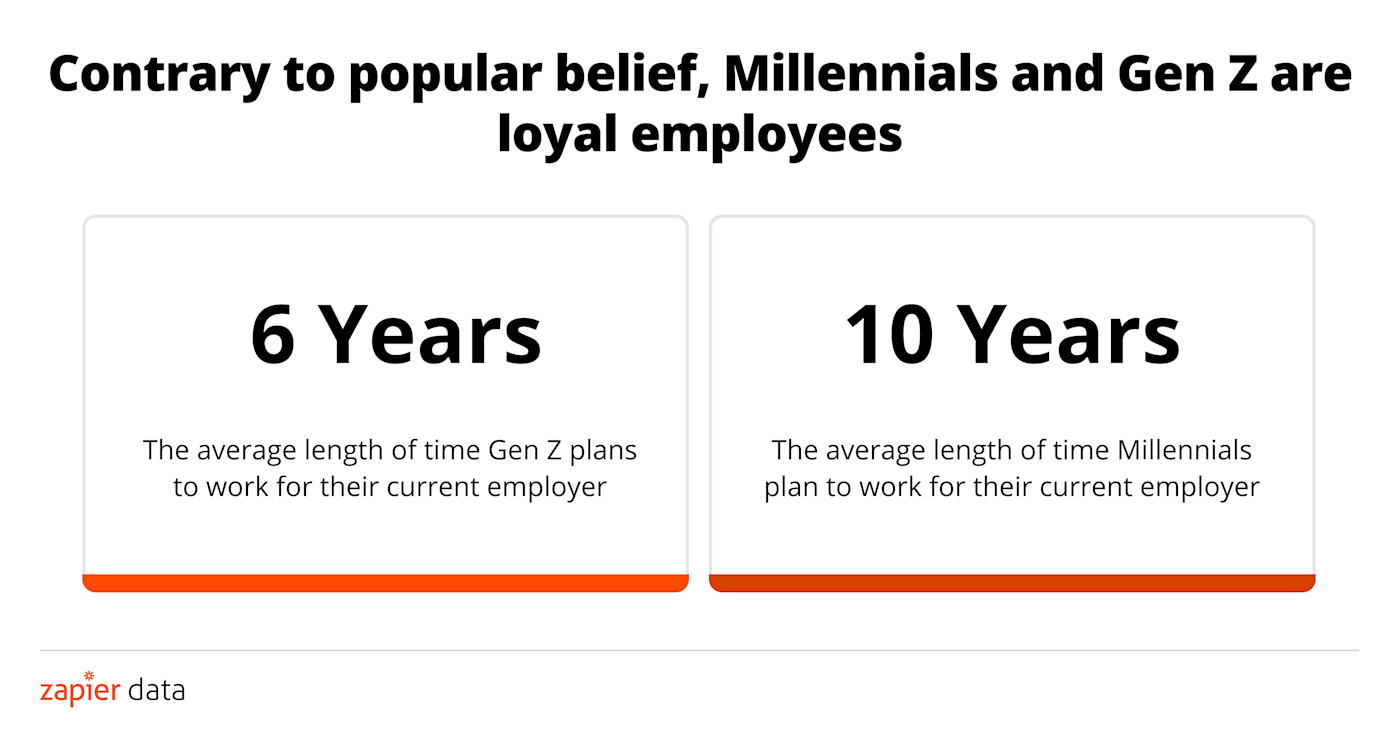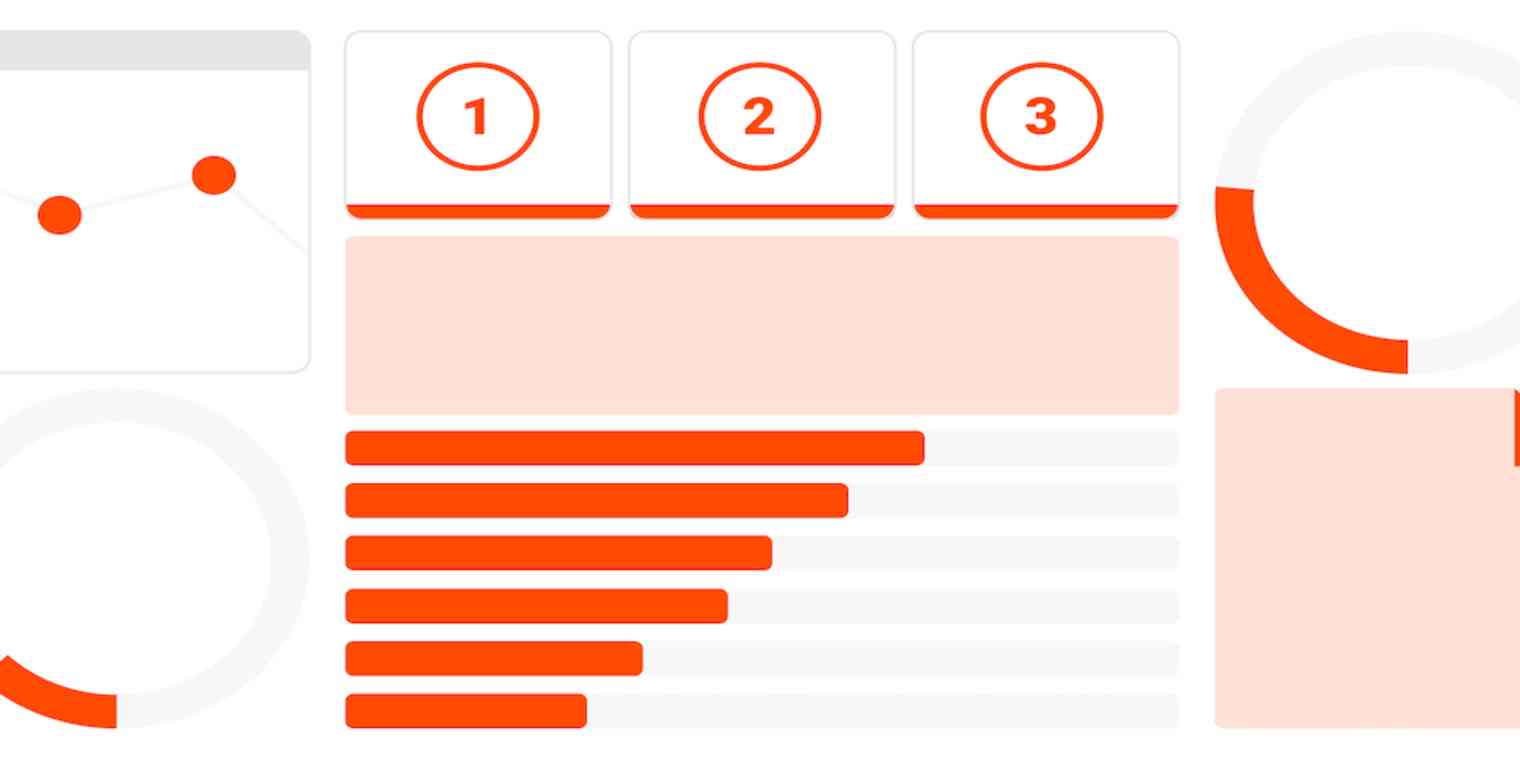Millennials and Gen Z have heard a lot about their work ethic and attitudes. Turns out they disagree with most of it.
You might think younger generations are disloyal to employers. Turns out most see their job as core to their identity, and want to stay in their current job long term. You might think younger generations are wasting work time on social media. Turns out many are doing the opposite, spending their evenings responding to work communications.
These younger generations, all digital natives, are also extremely comfortable with technology. An overwhelming majority are willing to automate parts of their job, for example. We learned all this, and more, by commissioning The Harris Poll to survey a cross-section of Millennial and Gen Z workers. Here's more of what we learned.
About Zapier: Zapier helps more than 4 million people grow their businesses with the power of automation by connecting over 1,500 apps. Founded in 2011, Zapier has always operated as an entirely remote company, and today has nearly 300 employees working in 27 countries around the world.
Millennials and Gen Z have real responsibilities and want to be loyal
Younger generations have a reputation for avoiding responsibility and jumping jobs at a moment's notice, but is that accurate? Our data shows that more than half of Millennial workers are managers and plan on staying at their current job for a total of ten years.

Roughly three-quarters of Millennial (ages 24-39) employees (76 percent) and almost two-thirds of Gen Z (ages 18-23) employees (64 percent) work in knowledge-based jobs — including professional, managerial, or administrative work.
Millennial employees plan to stay at their current job for a total of 10 years, on average, compared to Gen Z employees who plan to stay for a total of 6 years, on average.
More than 3 in 5 Millennial employees (62 percent) and nearly half of Gen Z employees (49 percent) say they have direct reports.
Young workers don't just embrace tech—they demand it
The majority of young managers refuse to hire candidates with no basic computer knowledge, and younger employees are willing to walk away from a job with bad tech. Young workers also see automation as a way to get more done.

Just over two-thirds of Gen Z employees (69 percent) and more than three-quarters of Millennial employees (76 percent) say they would be less likely to hire someone if they did not have basic computer skills.
One in 6 Gen Z and Millennial employees (16 percent each) have quit a job because their employer did not provide the proper technology for them to do their job.
Nearly 4 in 5 Gen Z managers (79 percent) and over 4 in 5 Millennial managers (85 percent) say they encourage their direct reports to solve problems using technology. This includes technologies like automation, with almost 9 in 10 Gen Z (86 percent) and Millennial (87 percent) managers say they are open to their direct reports automating parts of their job.
Younger workers embrace automation as a solution, and nearly all Gen Z (95 percent) and Millennial (93 percent) employees say they would be willing to automate parts of their job.
Social media addicts? More like workaholics. Tech overload could be behind employee burnout
An overwhelming majority of young workers look at work communication tools outside of work. One-third check work messages more often than social networks.

Roughly 7 in 10 Gen Z (71 percent) and Millennial (69 percent) employees admit they are constantly on or checking their work communication tools outside of work.
One-third of Gen Z employees (33 percent) and almost 2 in 5 Millennial employees (39 percent) say they check their work email/messaging tools more than they check their personal social media.
Roughly two-thirds of Gen Z employees (66 percent) and almost 3 in 5 Millennial employees (57 percent) say they expect their teammates to respond to them outside of work hours.
While perhaps unsurprising due to their inability to unplug, a majority of Gen Z (69%) and Millennial (73%) employees have experienced periods of decreased work productivity due to job burnout.
Millennial and Gen Z work attitudes, compared
Younger workers overwhelmingly see work as core to their identity—even if they can't explain their job to their parents.

Almost two-thirds of Gen Z employees (65 percent) and nearly three-quarters of Millennial employees (73 percent) feel their job is a key component of their personal identity.
Over 2 in 5 Gen Z (41 percent) and Millennial (45 percent) employees think their parents don’t really understand their job.
Most Gen Z (91 percent) and Millennial (85 percent) employees think all employers should have a mental health work policy in place.
More than three-quarters of Gen Z (77 percent) and Millennial (78 percent) employees say the ability to discuss mental health openly at work is important to them.
One-quarter of Gen Z employees (25 percent) and nearly a third of Millennial employees (31 percent) say they have felt competitive against their coworkers.
About one-quarter of Gen Z (27 percent) and Millennial (24 percent) employees say they discuss politics with coworkers.
Methodology: This survey was conducted online within the United States by The Harris Poll on behalf of Zapier from January 8-10, 2020 among 519 Gen Z U.S. adults ages 18-23 and 519 Millennial U.S. adults ages 24-39. This online survey is not based on a probability sample and therefore no estimate of theoretical sampling error can be calculated.



